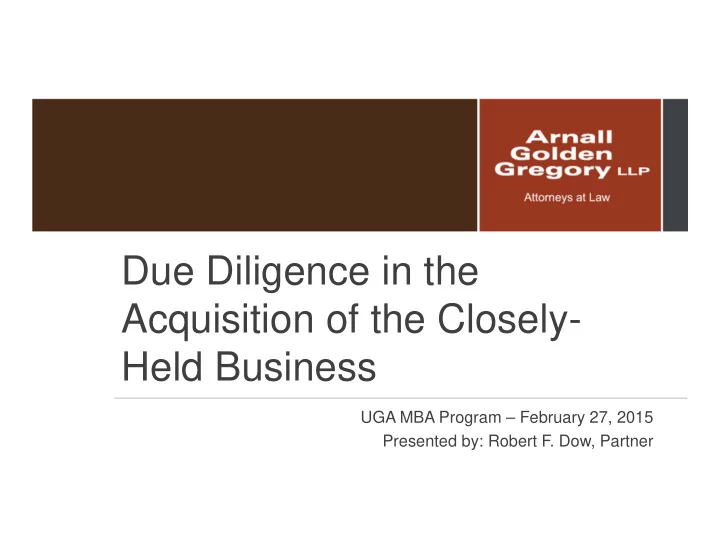

Due Diligence in the Acquisition of the Closely- Held Business UGA MBA Program – February 27, 2015 Presented by: Robert F. Dow, Partner
Definition of Due Diligence Investigation of the other party and its business The process by which a company considering an acquisition will attempt to verify that it will get what it bargained for Often a neglected aspect of a transaction 2
Purposes of Due Diligence Go/no-go decision on closing the deal Finding undisclosed liabilities and problems Liability protection for D&Os Confirming or adjusting the price Determining adjustments to other deal terms Verifies initial financial, legal and operational assumptions made by the purchaser Allows parties to address issues and risks prior to closing Narrows the focus of representations and warranties Planning for post-closing integration Tax planning Setting the baseline for earn-outs 3
Factors that Determine the Scope of Due Diligence Objectives of the deal Deal structure Materiality of the deal Industry Existing knowledge of the target Time and resources available Relative bargaining position of the parties 4
Timing of Due Diligence Prior to contacting target Prior to bid Prior to LOI After LOI, before definitive agreement After definitive agreement 5
Due Diligence is a Two-Way Street (cont’d) Typically, purchaser conducts due diligence of seller Due diligence of purchaser may also be appropriate – Seller receives stock of purchaser in the transaction – Seller provides financing to the purchaser in the transaction – Purchase price depends upon purchaser’s performance, e.g., an earnout 6
Due Diligence with Competitors (cont’d) Seller’s reluctance to share information; concerned information may be used to seller’s disadvantage Customer lists and intellectual property Execute Non-Disclosure Agreement Increase disclosure of information with increased commitment from the other party – e.g., execution of the letter of intent 7
Focus Due Diligence on Particular Transaction Understand the business of the other party Service business – Intellectual Property – Key management and personnel – Employment agreements, non-solicitation agreements and non- compete agreements – Stock Option Plans – Customer contracts 8
Focus Due Diligence on Particular Transaction (cont’d) Real estate intensive – Title policies – Covenants, conditions and restrictions of record – Surveys – Leases Start up businesses vs. well-established businesses 9
Intellectual Property Seller’s technology can be its most valuable asset Value may depend on the ability to exclude others from using the technology, i.e., strength of intellectual property rights Increasingly important component of the assets of many companies 10
Other Problem Areas Employment arrangements Environmental Customer lists Data security Regulatory compliance Potential litigation risks 11
Results of Due Diligence Allocate discovered risks between the parties Address particular issues in representations, warranties and indemnification Restructure original terms of the transaction based upon due diligence – Adjust the purchase price – Adjust the payment terms – Include escrows and holdbacks Change the legal structure of the deal Terminate the transaction 12
Representations and Warranties Guarantees by Seller Snapshot of business as of signing and closing Purposes – Framework for due diligence – Provide closing “out” – Provide Buyer with post-closing remedies against Seller 13
Material Adverse Change Clause Sets a minimum threshold for Seller responsibility Allow Buyer to cancel the deal above that threshold Keep in mind while conducting due diligence 14
Key Representations Capitalization Title to stock/assets Accuracy of financial statements No undisclosed liabilities Taxes Absence of changes since audited financials Compliance with laws Employee benefit plans 15
Key Representations (cont’d) Condition of assets Environmental Intellectual property Labor matters Related party transactions Third party consents Material contracts 16
Type of Sales Process Responding to unsolicited offer Targeted sale to specific buyer or group Limited auction process Full auction Distressed sale 17
Legal Form of Transaction Sale of assets – “Asset Purchase Agreement” – Exchange purchase price for bundle of assets – Can “cherry pick” liabilities – Potential complications in individual asset transfers – Allows “step up” of assets for purchaser Sale of stock – “Stock Purchase Agreement” – Exchange purchase price for all stock of target – Easiest form of transfer but need all shareholders consent Merger – “Agreement and Plan of Merger” – Merge target with acquirer or its subsidiary – Can “freeze out” minority shareholders, but they may have dissenters rights 18
Consideration All cash up front Deferred purchase price (earnout) Stock as a portion of the purchase price Seller financing – subordinated security interest in the purchased assets – pledge of stock in stock purchase – personal guaranties 19
Brief Overview of Some Tax Issues Structuring a tax-free reorganization Capital gains vs. ordinary income Step-up of assets Allocation of purchase price State and local taxes Gift and estate tax implications for owners 20
NOTICE This presentation was prepared for educational purposes only. It may not be relied upon as the legal or tax advice of the author or Arnall Golden Gregory LLP with respect to any specific transaction. NOTICE: We inform you that any information contained in this communication (including any attachment) is not intended to be used, and cannot be used, for the purpose of (i) avoiding penalties under the Internal Revenue Service or (ii) promoting, marketing or recommending to another party any transaction or matter addressed in this communication. 21
AGG’s Securities and Corporate Governance Practice Arnall Golden Gregory LLP counsels public and private companies, as well as officers, directors, investors, and underwriters, in matters regarding transactions, compliance and corporate governance. Our clients include entrepreneurial private companies, as well as companies listed on NYSE, NASDAQ, AMEX and OTC Bulletin Board. We work together with those clients to provide solutions that make sense given their goals and resources. We regularly counsel companies and underwriters in a variety of complex securities transactions, including initial and follow-on public offerings, “going private” and “roll-up” transactions, mergers, PIPES offerings, and private offerings. 22
For more information, please contact: Robert F. Dow, Esq. - Partner 171 17th Street, NW, Suite 2100 Atlanta, Georgia 30363-1031 404.873.8706 (phone) 404.873.8707 (fax) robert.dow@agg.com
Recommend
More recommend